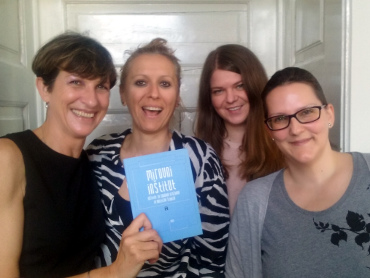CEINAV – Cultural Encounters in Interventions Against Violence (Violence, Inequality, and Human Rights)
The project takes a dual approach to cultural encounters as they play out in ethics, justice, and citizenship, through a focus on the fundamental rights of women and of children to safety from violence. It will explore both national legal and institutional cultures as they affect practices of intervention, and the growing diversity within European countries, where symbolic boundaries of cultural belonging can define social exclusion and inclusion. Four EU countries – Germany, Portugal, Slovenia and the United Kingdom – will be studied, and differing approaches to the protective role of the state (as expressed in law, policing, and social welfare intervention) will be contextualized in the history of colonialism, democracy, migration, and diversity.
The research will explore on the one hand why, despite an explicit European consensus on stopping violence against women and protecting children from harm, the practices of intervention and the rationales behind them differ between countries, and on the other hand, how policies and institutional practices intended to ensure the “best interests of the child” and the freedom and safety of women from violence may be deployed differently and have quite different effects for disadvantaged minorities within each country. In consultation with 11 associate partners who represent networks of practitioners and stakeholders the project will focus on three forms of violence for which state responsibility is well established: intimate partner violence, child abuse and neglect, and trafficking for sexual exploitation. Using paradigmatic narratives, in-depth discussions with professionals involved in intervention will be analysed for their implicit and explicit discursive constructions and normative representations. Exploring the perspectives of stakeholders who work with migrant and minority women and children will illuminate the tensions each group negotiates and through this enrich the debates on multiculturalism and diversity.
The project will also give space to the voices of women and children who have travelled through a personal history of violence and of social interventions. Collecting their stories and working in a creative art process will seek to uncover the potential both of narrative and of visual representation to stimulate the imagination needed to hear different voices and to recognise the agency of victims. Artist-researchers in each of the four countries will integrate creative art and aesthetic education as instruments through which disempowered voices may be heard, creating resources that can be used in change processes.
Comprising innovative methodological approaches, theory-based research and a creative synergy CEINAV will work ‘in between’ research, policy and practice. The project will analyse ethical issues of rights and discrimination, seeking to clarify the implications of European norms and of practices of protection, taking account of multiple and intersecting structures of power and oppression. It will frame an intersectional approach to intervention that recognises the voice and agency of diverse victims. Alongside a set of research papers and scripted videos the outcome will be a document outlining ethical foundations for responsible practice.
More on: http://ceinav-jrp.blogspot.co.uk/
We are bunch of joyful yet hard working scholars. The group consists of (from left to right) Vlasta Jalušič (principal investigator), Lana Zdravković (researcher and artist), Katarina Vućko (researcher) and Veronika Bajt, (researcher) The areas we cover at our institute are political science/theory, racism and nationalism, gender studies, migration and human rights.
Results
- Book “Interventions Against Child Abuse and Violence Against Women: Ethics and culture in practice and policy”, Carol Hagemann-White Liz Kelly Thomas Meysen (eds.), 2019, brings theoretical reflections based on the researching the voices of professionals and of victim survivors in four countries – England & Wales, Germany, Portugal and Slovenia. The sections are organised to reflect the overlapping and to multiply linked streams of work and thinking within the project, which mainly focused on the ethical issues emerging from narratives and the ethical dilemmas experienced by professionals, given the different legal and institutional systems, histories and cultural traditions in the four countries.
- An Anthology of Stories in four languages from England & Wales, Germany, Portugal and Slovenia, “Experiences of Intervention Against Violence”, Bianca Grafe, Carol Hagemann-White (eds.), 2016. The stories in the anthology emerged from interviews with women and young people about their experience of intervention when they were escaping a situation of abuse, neglect and/or sexual exploitation.
- Film “Everything I Told Them” (Vlasta Jalušič, Lana Zdravković, 2016, english subtitles, 47 min.) in a documentary manner raises the question of why, despite explicit European consensus on ending violence against women and protecting the children, mediation practices and their justifications differ between countries so much, and how policies and institutional practices that provide both the “best for the child” and the freedom and security of women against violence can evolve differently and have quite different effects for disadvantaged minorities in each country.
Everything I Told Them (Trailer) | Everything I Told Them (Film)

